一般过去时态2
英语八种时态的三种句式

(一)句中含有be动词时:
1、肯定句:主语+be+其他。
We are Chinese.
2、否定句:主语+be + not+其他。We are not Chinese.
3、一般疑问句:Be+主语+其他? Are you Chinese?
(二)句中没有be动词,含有实义动词时: 主语是三单时: 1、肯定句:主语+三单动词+其他。
The girls will not go shopping this weekend. 3、一般疑问句:Will+主语+动词原形+其他?
Will the girls go shopping this weekend?
四、现在进Байду номын сангаас时
1、肯定句:主语+am/is/are+现在分词+其他。 They are swimming in a river now.
八、过去完成时态
1、肯定句:主语+had+过去分词+其他。 I had finished reading the book by 8:00 last night. 2、否定句:主语+had+not+过去分词+其他。 I had not finished reading the book by 8:00 last night. 3、一般疑问句:Had+主语+过去分词+其他? Had you finished reading the book by 8:00 last night.?
I didn’t visit an old man last Sunday. 3、一般疑问句:Did+主语+动词原形+其他?
英语四种一般时态

一般过去时态一般过去时态:表示过去某一时间所发生的动作或存在的状态。
谓语动词要用一般过去式。
经常与yesterday (昨天), last week(上周), last month(上个月), last year(去年), two months ago(两个月前), the day before yesterday(前天),in 1990 (在1990年), in those days (在那些日子里)等表示过去的时间状语连用。
如: I was born in 1990. (我出生在1990年)。
When did you go to the park? (你是什么时候去的公园)。
I went to the park last week. (我是上周去的公园)在上面的句子中第一句属于be动词的一般过去时态;第二句和第三句属于实义动词的一般过去时态。
1. Be 动词的一般过去时态在没有实义动词的句子中使用be动词, am is 的过去式为was; are的过去式为were.构成:肯定句:主语+was (were) +宾语如:I was late yesterday. (昨天我迟到了。
)否定句:主语+was (were) +not+宾语如:We weren't late yesterday. (我们昨天没迟到) 疑问句:Was (Were) +主语+宾语如: Were you ill yesterday? (你昨天病了吗?)肯定回答: Yes, I was. (是的,我病了。
)否定句: No, I wasn't. (不,我没病。
)特殊疑问句:特殊疑问词+was (were) +主语+宾语如:When were you born? 你是什么时候出生的?2.实义动词的一般过去时态肯定句要使用动词的过去式,否定句和疑问句要使用助动词do和 does 的过去式 did.肯定句为:主语+动词过去式+宾语如: I went home at nine o'clock yesterday.(我昨天九点钟回的家。
英语专项 语法 时态 2 一般过去时 讲解+练习+答案 simple past
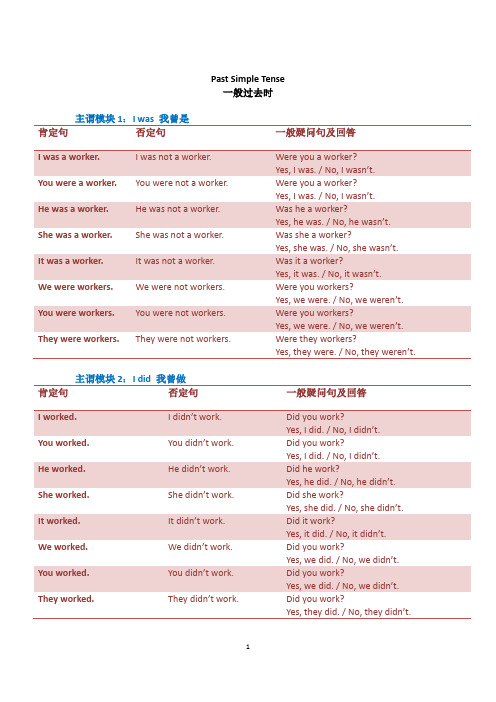
Past Simple Tense一般过去时主谓模块1:I was 我曾是肯定句否定句一般疑问句及回答Yes, I was. / No, I wasn’t.He was a worker. He was not a worker. Was he a worker?Yes, he was. / No, he was n’t. She was a worker. She was not a worker. Was she a worker?Yes, she was. / No, she was n’t.It was a worker. It was not a worker. Was it a worker?Yes, it was. / No, it was n’t.We were workers. We were not workers. Were you workers?Yes, we were. / No, we were n’t. You were workers. You were not workers. Were you workers?Yes, we were. / No, we were n’t. They were workers. They were not workers. Were they workers?Yes, they were. / No, they were n’t.主谓模块2:I did 我曾做肯定句否定句一般疑问句及回答Yes, I did. / No, I did n’t.He worked. He did n’t work.Did he work?Yes, he did. / No, he did n’t. She worked. She did n’t work. Did she work?Yes, she did. / No, she did n’t. It worked. It did n’t work. Did it work?Yes, it did. / No, it did n’t.We worked. We did n’t work. Did you work?Yes, we did. / No, we did n’t. You worked. You did n’t work.Did you work?Yes, we did. / No, we did n’t. They worked. They did n’t work.Did you work?Yes, they did. / No, they did n’t.标准句子结构●主谓模块1+X+时间模块I was a worker then. 那时我还是一个员工。
【英语】过去将来时一般过去时知识点总结(2)

【英语】过去将来时一般过去时知识点总结(2)一、过去将来时1.When we were boys we swimming every summer.A. goB. would goC. wentD. goes【答案】B【解析】【分析】句意:小时候,每到夏天我们都要去游泳。
When引导时间状语从句,从句用一般过去时,主句用过去将来时,would+动词原形,表示过去习惯性的动作。
故选B。
【点评】考查would+动词原形表习惯性动作。
2.—What did your son say in the letter?—He told me that he __________ the Great Wall the next day.A. will visitB. has visitedC. is going to visitD. would visit【答案】 D【解析】【分析】句意:你的儿子在信中说什么?他告诉我他第二天要去参观长城.结合语境可知从句描述的是站在过去角度看将来发生的动作,故用过去将来时态,故选D.【点评】英语中的时态主要是借助于时间状语与上下文语境来进行判断。
解答此类题型,首先要注意句子中的时间状语,如果没有则要通过分析上下文,结合语境来判断句子的时态。
英语疑问句中一般具有时态上的对应关系,注意结合这一特点进行区分。
3.Mr. Wu said he ______ us to the zoo the next week.A. would takeB. will takeC. takeD. takes【答案】 A【解析】【分析】句意:吴老师说他下周会带我们去动物园。
在这个句子中,said 后面跟的是一个宾语从句,从句中的时态是由主句决定的。
主句中said 用的是过去时,故宾语从句中也需用过去时态。
the next week 下周,是一个将来的时间。
故应该用过去将来时。
故选A。
【点评】考查动词时态。
一般过去时2

一般过去式1编辑点评:一般过去时表示过去某一时候或某一段时间所发生了的事情或存在的状态。
常与过去时间yesterday, this morning, just now, a moment ago, in May, last night / year / week, once upon a time, the other day, before …, when –clause, in the past连用。
一般过去时表示:过去某个时间里发生了的动作。
(句子语境是过去时,主语时第三人称单数,谓语动词无需变成第三人称单数形式,直接变成过去式。
)一、写出下列动词的过去式1.am/is ________2.do _______3.go ________4.have _______5.isn’t _________6. aren’t ________7.spend________8.cook_______9.read ________ 10.clean _______ 11.live _______ 12.study_________二、用适当的词完成下列对话1.—How was your weekend? —It ______ gre at.—What _______ you ______ last weekend ? —I _______ some homework.2.—What ______ she ______ last weekend? —She _______ to the beach.3.—What _______ they do last weekend? —They ________ to the movies.三、用括号内所给词的适当形式填空1. We _________ (enjoy) ourselves at the party last night.2.Jack ____________ (study) for the English test last Sunday.3._______ you ______ (go) to the Great Wall last year?4. What day _______ (be) it yesterday?5.The old man _______(be)ill and went to see a doctor.6.We ________ (have) a party last night.7.We __________ (visit) the museum and went home.8.—How _______ (be) the students? —They were very friendly.9.He often _______ (have) supper at home. Today he ______ (have) supper at school.10.—______ he _______ (have) lunch at nine? —No, he didn’t.11.They _________(buy) a guitar yesterday.四、句型转换1. He came here last month. (改为否定句) He _______ _______ here last month.2.They played football this morning. (改为一般疑问句并作简略回答)—______ they _______ football this morning?—Yes, they _______./No, they _________ .3.They went to Beijing last year. (就划线部分提问)_________ _________ they ________ last year.4.Tom watched TV last night. (改为一般疑问句) _______ Tom _______ TV last night?5.Mary does homework every day. (用last night 改写句子)Mary ________ ____________ _________ ________ .五、选择填空( ) 1. Lee ________ his mobile phone at home.A. leaveB. leavesC. leavedD. left( ) 2. _____ he ________ a good rest? No, he didn’t.A. Do, hadB. Did, haveC. Did, hadD. Was, had( ) 3. As soon as he ________, he ______ to his family.A. arrived, writesB. arrived, writtenC. arrived, wroteD. arriveds, write( ) 4. Mr. Black was late bec ause he _______ his way.A. lostedB. loseC. losesD. lost( ) 5. When _________ Lee ________ school this morning?A. did, got toB. did, get toC. did, getD. did, got( ) 6. Will you please say it again? I ________ quite _______ you.A. didn’t, hearB. don’t, heardC. didn’t, heardD. don’t, hear( ) 7. ______ you ________ at six o’clock yesterday?A. Do ,get upB. Did, get upC. Do, got upD. Did, got up( ) 8.What did you see _________?A. nowB. every dayC. these daysD. just now( ) 9.He went into the room and _______ the door.A. lockB. lockingC. locksD. locked( ) 10. —What _____ you _______ last week? —I bought a bag.A. did ,buyB. did , boughtC. do, buyD. do, bought( ) 11. —_____ he ____ his lunch? —Yes, he did.A. Does ,hasB. Does, haveC. Did, haveD. Did, had( )12.—Did the thieves _____ into the car? —No, they______.A. fell, didn’tB. fall(落下), didC. jump(跳), didn’tD. jump, did( ) 13. -When did May come back from Hong Kong? -She __ from Hong Kong last Friday.A. come backB. comes backC. returned backD. came back( ) 14. ____ she _____ this dictionary in the bookshop nearby last week?A. Did, buyB. Does, buyC. Did, boughtD. Does, buys( ) 15. He ____ to the station this morning and was______ for the train.A. hurry, in timeB. hurries, on timeC. hurried, in timeD. hurried, at time( ) 16. Where _____ Uncle Sun yesterday? A. was B. were C. did D. does( ) 17. —Have you seen him today? —Yes, I ____ him this morning.A. seeingB. seeC. seesD. saw( ) 18. He ______ worried when he heard the news. A. is B. was C. does D. did ( ) 19. There _____ a telephone call for my brother Steven yesterday?A. isB. areC. wasD. were( ) 20. Liu Fengwei _____ three yuan for the lost library book.A. paidB. payC. spentD. lost( ) 21. He ____ in this school in 1958.A. taughtB. teachC. teachesD. teaching( ) 22. They _____ tired so they stopped ____ a rest.A. are, haveB. were, haveC. were, to haveD. are, having( ) 23. Yesterday I _____ in bed all day bec ause I had a fever.A. layB. lieC. laidD. lied( ) 24. It was raining hard when he ____ home.A. gotB. getC. getsD. was getting( ) 25. She said her brother ____ in Beijing. He ______ to Japan on business last week.A. wasn’t, wentB. hasn’t, wentC. wasn’t, goD. isn’t, went六、改错题1. How is Jane yesterday?2. He go to school by bus last week.3. He often goes home at 6:00 last month.4. I can fly kites seven years ago.5. Did you saw him just now.6. Tom wasn’t watch TV last night.7. I didn’t my homework yesterday. 8. He wait for you three hours ago.9. Who find it just now ? 10. What did he last week?七、用所给动词的适当形式填空1.Tom and Mary ___________ (come) to China last month.3.Mary __________ (read) English yesterday morning.4.There _________ (be) no one here a moment ago.5.I ___________ (call) Mike this morning.6.I listened but ___________ (hear) nothing.7.Tom ___________ (begin) to learn Chinese last year.st week we _________ (pick) many apples on the farm.9.My mother ________________ (not do) housework yesterday.10.She watches TV every evening. But she _______________ (not watch) TV last night.11.________ your father ________ ( go ) to work every day last year?12. —What time _______ you _______ (get) to Beijing yesterday? —We __________ (get) to Beijing at 9:00 in the evening.st year the teacher ___________ (tell) us that the earth moves around the sun.15.There ____________ a telephone call for you just now. (be)16.There __________ not enough people to pick apples that day. ( be)17.There _____________ any hospitals (医院) in my hometown (家乡) in 1940. ( be not)18.There ____________ enough milk at home last week, wasn’t there?19.Eli ____________ to Japan last week. ( move)20. –When _______ you _________ (come) to China? - Last year.21.Did she ________ (have) supper at home?22.Jack ____________ (not clean) the room just now.23._________ (be) it cold in your city yesterday?24.How many people ________ (be) there in your class last term?25.It ________ (be) hot yesterday and most children _______ (be) outside.26. There ________ (be) a football match on TV yesterday evening, but I _________ (have) no time to watch it.27. He ate some bread and _________ (drink) some milk.28. ________ he __________ (finish) his homework last night?29. I__________(be) tired yesterday.31. What _________ you ___________ (do) last night?32. My grandfather _________ (leave) Hong Kong for New York in 1998.33. What _______ he ________ (do) yesterday?34. Last week I _______ (buy) a new bike.35. He ________ (be) here just now.36. He __________ (not find ) his key last night.37. My father __________ (drink) a lot of wine yesterday.38. ________ you ________ (finish) your homework yesterday?39. I ________ (eat) some eggs and bread this morning.41. Last year Mr. Smith _____ (go ) to China and Japan.46. A week ago, Kitty and Ben _________ (be) in the countryside.54. Kitty and Ben ________ (stay) at home. They __________ (watch) TV.一、按要求变换句型。
英语一般过去时和过去进行时

英语一般过去时和过去进行时-CAL-FENGHAI.-(YICAI)-Company One1一、一般过去时(一)一般过去时时态(1)主要用来表示过去某一时间发生的(和现在没有联系的)动作或所处的状态,常有一个表示明确的过去的时间状语,如:the day before yesterday, yesterday, last week, three days ago, just now, at that time , in 1999等;或跟由while/when等引导的表示过去的时间状语从句;或有上下文暗示动作发生的时间是在过去① They were in Paris three years ago. 三年前他们在巴黎② When I was at college, I spoke three foreign languages. 上大学的时候,我讲三门外语。
③——Have you seen a pen I left here this morning,你看见一支笔了吗今天早上我这的。
—— Is it a black one I think I saw it somewhere. 是黑色的吗我想我在什么地方见到过。
(2)表示过去经常或反复发生的动作。
① He always got up late on Sundays. 周日他总是很晚才起床。
(3)表示客气,与过去式无关,一般用在情态动词中① Would/Could you please give me a hand 你能帮我一下吗(二)谓语构成一般过去时的谓语不管主语的人称和单复数都用动词的过去式表示,动词的过去式有规则与不规则两种。
规则动词的过去式在动词原形后加-ed, 不规则动词的过去式要逐个记忆。
规则动词的过去式变化方式如下:begin → began go → went see → saw do → did get → got come →came leave →left am →was are → were give → gave have → had think → thought(三)一般过去时的否定式和疑问式(1)实义动词的一般过去时的否定式和疑问式要用助动词did帮助构成。
小学六年级下册英语小升初时态课件(通用版) 一般过去时总复习2

4.疑问was/were调句首
• Were you at home the day before yesterday﹖ • Was she happy this morning﹖
肯定回答 Yes, 主语+was/were. 否定回答 No, 主语+wasn't/weren't. Were Xiao Qiang and Xiao Long here just now﹖
• yesterday或以其构成的短语: • yesterday morning • yesterday afternoon • yesterday evening • the day before yesterday
three days ago
Miss Zhu went to Tiantian Market three days ago.
其他家族
Long long ago
yesterday Now
一般过去时 yesterday ago just now in the old days in those days in 1980 the other day at that time once upon a time
一般将来时
现在 进行
• 现在学过的常用的表示过去的时间状语有: just now,a moment ago,yesterday,last week,last night, last weekend,last year,last month,three days ago,two weeks ago,five years ago…
• (3)末尾只有一个元音字母和一个辅音字母的重读闭音节,应 双写末尾的辅音字母,再加-ed,如:stop-stopped, shop-
一般过去时练习题及讲解 2
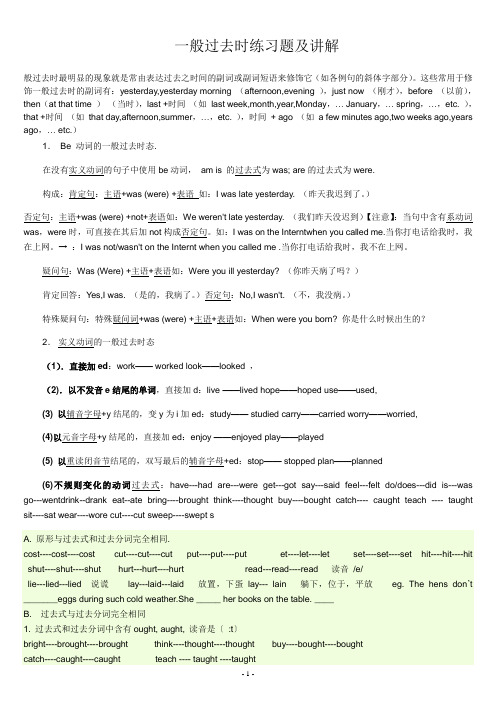
一般过去时练习题及讲解般过去时最明显的现象就是常由表达过去之时间的副词或副词短语来修饰它(如各例句的斜体字部分)。
这些常用于修饰一般过去时的副词有:yesterday,yesterday morning (afternoon,evening ),just now (刚才),before (以前),then(at that time )(当时),last +时间(如last week,month,year,Monday,… January,… spring,…,etc. ),that +时间(如that day,afternoon,summer,…,etc. ),时间+ ago (如a few minutes ago,two weeks ago,years ago,… etc.)1.Be 动词的一般过去时态.在没有实义动词的句子中使用be动词,am is 的过去式为was; are的过去式为were.构成:肯定句:主语+was (were) +表语如:I was late yesterday. (昨天我迟到了。
)否定句:主语+was (were) +not+表语如:We weren't late yesterday. (我们昨天没迟到)【注意】:当句中含有系动词was,were时,可直接在其后加not构成否定句。
如:I was on the Interntwhen you called me.当你打电话给我时,我在上网。
→:I was not/wasn't on the Internt when you called me .当你打电话给我时,我不在上网。
疑问句:Was (Were) +主语+表语如:Were you ill yesterday? (你昨天病了吗?)肯定回答:Yes,I was. (是的,我病了。
)否定句:No,I wasn't. (不,我没病。
)特殊疑问句:特殊疑问词+was (were) +主语+表语如:When were you born? 你是什么时候出生的?2.实义动词的一般过去时态(1).直接加ed:work—— worked look——looked ,(2).以不发音e结尾的单词,直接加d:live ——lived hope——hoped use——used,(3) 以辅音字母+y结尾的,变y为i加ed:study—— studied carry——carried worry——worried,(4)以元音字母+y结尾的,直接加ed:enjoy ——enjoyed play——played(5) 以重读闭音节结尾的,双写最后的辅音字母+ed:stop—— stopped plan——planned(6)不规则变化的动词过去式:have---had are---were get---got say---said feel---felt do/does---did is---was go---wentdrink--drank eat--ate bring----brought think----thought buy----bought catch---- caught teach ---- taught sit----sat wear----wore cut----cut sweep----swept sA. 原形与过去式和过去分词完全相同.cost----cost----cost cut----cut----cut put----put----put et----let----let set----set----set hit----hit----hit shut----shut----shut hurt---hurt----hurt read---read----read 读音/e/lie---lied---lied 说谎lay---laid---laid 放置,下蛋lay--- lain 躺下,位于,平放eg. The hens don’t _______eggs during such cold weather.She _____ her books on the table. ____B. 过去式与过去分词完全相同1. 过去式和过去分词中含有ought, aught, 读音是〔:t〕bright----brought----brought think----thought----thought buy----bought----boughtcatch----caught----caught teach ---- taught ----taught( )1.my father______ill yesterday.a.isn't b.aren't c.wasn't dweren't ( )2.______your parents at home last week﹖a.is b.was c.are d.were ( )3.the twins______in dalian last year.they______here now.a.are; were b.were; are c.was; are d.were; was( )4.______your father at work the day_____yesterday(前天)﹖a.was; before b.is; before c.was; after d.is; after ( )5.—who was on duty last friday﹖—______.a.i am b.i was c.yes, i was d.no, i wasn't ( )6. i cleaned my classroom ___________.a with three hoursb three hours agoc in three hoursd three hours before ( ) 7. i came _______ my house two days ago .a back onb back toc to backd back( ) 8 . ___________? he did some reading at home.a what does your father do yesterday eveningb what does your brother do in the schoolc what did your brother do over the weekend d where did your brother go last sunday ( ) 9. what did you do ________ ? i went to the movies.a next morningb over the weekendc in the weekend d next monday( )10. the koala sleeps _______,but gets up _________.a during the day; at the eveningb at day ;during nightc in the day ;during the eveningd during the day ; at night二、请用正确动词形式填空。
2.英语时态(2)过去
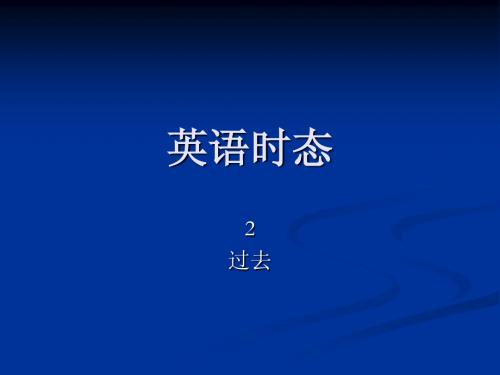
4.否定形式: was/were+not;在行为动词前加didn't,同时还原行 为动词。 5.一般疑问句: was或were放于句首;用助动词do的过去式did 提 问,同时还原行为动词。 6.例句: She often came to help us in those days. I didn't know you were so busy.
在含有时间状语从句的复合句中,延续时间较长的动作用 过去进行时,另一个动作用一般过去时。如果表示两个延 续动作在过去某一时刻同时进行,而不考虑动作的先后长 短,则主句和从句的谓语动词都用过去进行时。 My pen dropped on the ground when I was walking in the park. 我在公园散步的时候,我的钢笔掉到地上了。 When I entered the room, she was sitting at her desk.我进屋的 时候,她正坐在书桌前面。 The students were reading while the teacher was grading their homework.学生们在看书,而老师在批改他们的家庭作业。
2. 表示过去连续发生的动作时,要用过 去时
这种情况下,往往没有表示过去的时 间状语,而通过上下代来表示。 The boy opened his eyes for a moment, looked at the captain,and then died. 那男孩把眼睛张开了一会儿,看看船 长,然后就去世了。
(2)表示过去某段时间正在进行的动作。 Shirley was writing a book about China last year but I don't know whether she has finished it.舍 利去年在写一本有关中国的书,但我不知 道他是否完成。 They were building a dam last winter.去年冬天 他们在建大坝。 I was living in my teacher's house when I was in middle school.上中学时,我住在老师家里。
(完整版)一般现在时一般过去时现在进行时过去进行时归纳总结
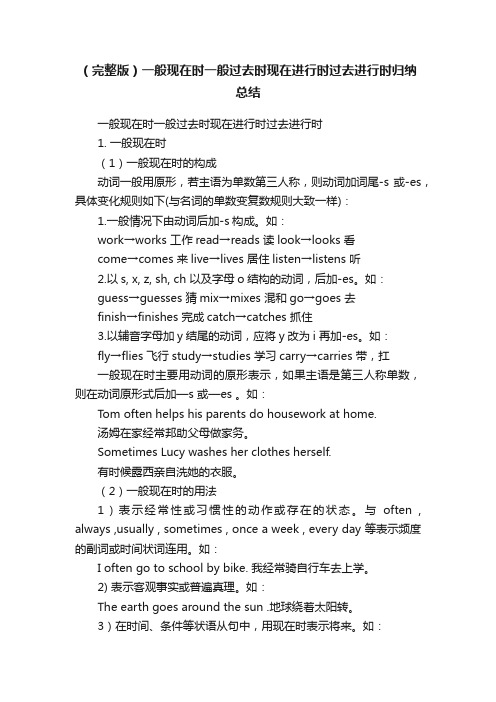
(完整版)一般现在时一般过去时现在进行时过去进行时归纳总结一般现在时一般过去时现在进行时过去进行时1. 一般现在时(1)一般现在时的构成动词一般用原形,若主语为单数第三人称,则动词加词尾-s或-es,具体变化规则如下(与名词的单数变复数规则大致一样):1.一般情况下由动词后加-s构成。
如:work→works 工作read→reads 读look→looks 看come→comes 来live→lives 居住listen→listens 听2.以s, x, z, sh, ch 以及字母o结构的动词,后加-es。
如:guess→guesses 猜mix→mixes 混和go→goes 去finish→finishes 完成catch→catches 抓住3.以辅音字母加y结尾的动词,应将y改为i 再加-es。
如:fly→flies 飞行study→studies 学习carry→carries 带,扛一般现在时主要用动词的原形表示,如果主语是第三人称单数,则在动词原形式后加—s 或—es 。
如:Tom often helps his parents do housework at home.汤姆在家经常邦助父母做家务。
Sometimes Lucy washes her clothes herself.有时候露西亲自洗她的衣服。
(2)一般现在时的用法1)表示经常性或习惯性的动作或存在的状态。
与often , always ,usually , sometimes , once a week , every day 等表示频度的副词或时间状词连用。
如:I often go to school by bike. 我经常骑自行车去上学。
2) 表示客观事实或普遍真理。
如:The earth goes around the sun .地球绕着太阳转。
3)在时间、条件等状语从句中,用现在时表示将来。
如:If it rains tomorrow, we won’t go to the park.如果明天下雨,我们就不去公园了。
时态专练(二) 一般过去时

语法专练:一般过去时专练(二)一、写出过去式(总结其变化规律)1. perform dance live like2.is / am are can has/ have3.do/does play miss watch4.sing begin go come5.forget get make give6.buy say fly carry study7.bring sit blow tell see8.meet , eat , begin , give , go ,9.take sing二、填空1. I to school by bike yesterday(go)2. He read English books at the age of five ( can)3.They a birthday party for me last Sunday( have)4. We some songs yesterday.(sing)5.He played the piano yesterday( 划线提问) he yesterday?(否定问句) He the piano yesterday(一般问句) he the piano yesterday?Yes, No,三、1. last night2. can ,at the age of fivest Sunday4. yesterdayst week四、情景交际1.你想问对方什么时候出生的,可这样问:2.你想问对方昨天去哪里了,可这样问:3.你想问你朋友,上星期呆在家多久,可这样问:4.你五岁的时候会骑单车,可这样说:I5.你们昨晚在晚会上玩得愉快,可这样表达:五、课文填空Kangkang’s birthday partyWe had a [ˈbɜːθdeɪ] party for Kangkang at his home last [ˈsʌndeɪ] .His parents (buy) lots of food and drinks us.We ( bring) many [ p'rɪzents] for him. Each of us ( give) Kangkang a birthday card, too.We ( make) the cards by . He liked them very much.There was a birthday cake 13 candles on it. We all ( sit) around the cake. Kangkang made a , and then he [ blu:] out the . We danced, (sing) songs and played games at the party.[ˈevriwʌn] had a good .背诵该短文(基础比较弱的同学,可看中文提示,用英语复述,然后默写)上星期天我们为康康办了一个生日聚会,他的父母买了许多食物和饮料给我们,给了康康一张生日贺卡,我们亲手做卡片,康康很喜欢它们。
英语四种一般时态
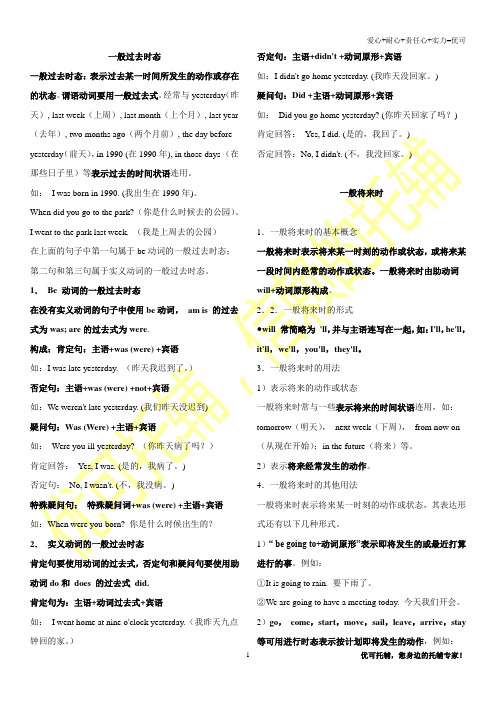
一般过去时态一般过去时态:表示过去某一时间所发生的动作或存在的状态。
谓语动词要用一般过去式。
经常与yesterday(昨天), last week(上周), last month(上个月), last year (去年), two months ago(两个月前), the day before yesterday(前天),in 1990 (在1990年), in those days (在那些日子里)等表示过去的时间状语连用。
如:I was born in 1990. (我出生在1990年)。
When did you go to the park? (你是什么时候去的公园)。
I went to the park last week. (我是上周去的公园)在上面的句子中第一句属于be动词的一般过去时态;第二句和第三句属于实义动词的一般过去时态。
1.Be 动词的一般过去时态在没有实义动词的句子中使用be动词,am is 的过去式为was; are的过去式为were.构成:肯定句:主语+was (were) +宾语如:I was late yesterday. (昨天我迟到了。
)否定句:主语+was (were) +not+宾语如:We weren't late yesterday. (我们昨天没迟到)疑问句:Was (Were) +主语+宾语如:Were you ill yesterday? (你昨天病了吗?)肯定回答:Yes, I was. (是的,我病了。
)否定句:No, I wasn't. (不,我没病。
)特殊疑问句:特殊疑问词+was (were) +主语+宾语如:When were you born? 你是什么时候出生的?2.实义动词的一般过去时态肯定句要使用动词的过去式,否定句和疑问句要使用助动词do和does 的过去式did.肯定句为:主语+动词过去式+宾语如:I went home at nine o'clock yesterday.(我昨天九点钟回的家。
一般过去时态精讲

we’ve got a new contract there.
It _____ was (be) an awful drive home. The traffic(交通) was _____ (be) terrible.
用括号里动词的适当形式填空。
read (read) that book last week. 1. He __________ arrived (arrive) just in time for the show. 2. Last night he ___________ married (marry) Thomas yesterday. 3. Mary ___________ showed (show) us where to sit at the meeting yesterday. 4. Tom ___________ visited (visit) Uncle Jack. 5. Last summer we ___________ rained (rain) almost every day last month. 6. It ___________
used lived woke kept said cleaned bought played learnt/ed saw read stopped
ran run borrow borrowed grew grow watch watched wrote write smiled smile
open begin swim carry study finish
三、一般过去时的构成
所有时态都是通过动词变化来表现的
• E.g. • You are right. • • I want to go to school.
一般过去时(2)
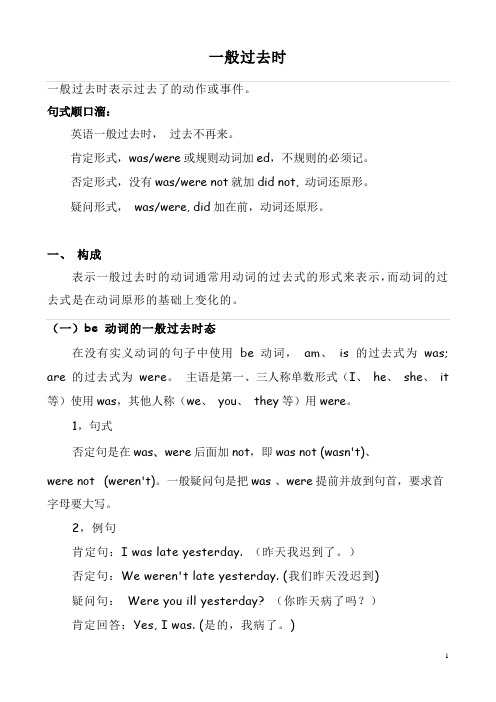
一般过去时一般过去时表示过去了的动作或事件。
句式顺口溜:英语一般过去时,过去不再来。
肯定形式,was/were或规则动词加ed,不规则的必须记。
否定形式,没有was/were not就加did not, 动词还原形。
疑问形式,was/were, did加在前,动词还原形。
一、构成表示一般过去时的动词通常用动词的过去式的形式来表示,而动词的过去式是在动词原形的基础上变化的。
(一)be 动词的一般过去时态在没有实义动词的句子中使用be动词,am、is 的过去式为was; are的过去式为were。
主语是第一、三人称单数形式(I、he、she、it 等)使用was,其他人称(we、you、they等)用were。
1,句式否定句是在was、were后面加not,即was not (wasn't)、were not (weren't)。
一般疑问句是把was 、were提前并放到句首,要求首字母要大写。
2,例句肯定句:I was late yesterday. (昨天我迟到了。
)否定句:We weren't late yesterday. (我们昨天没迟到)疑问句:Were you ill yesterday? (你昨天病了吗?)肯定回答:Yes, I was. (是的,我病了。
)否定回答:No, I wasn't. (不,我没病。
)特殊疑问句:Where were you yesterday? (你昨天在哪里?)(二)实义动词的一般过去时态实义动词的过去式分为规则动词和不规则动词。
1,规则动词的过去式变化如下:(1)一般情况下,动词词尾加ed ,如:work--worked play—played want--wanted(2)以不发音的 e 结尾动词,动词词尾加d,如:live--lived hope--hoped love--loved(3)以辅音字母+ y结尾的动词,把y变为i 再加ed,如:study--studied carry--carried(4)重读闭音节单词,双写最后一个辅音字母,再加ed,如:stop--stopped shop-- shopped skip--skipped2,不规则动词的过去式注:不规则动词的过去式变化规律性不强,须多加记忆。
一般过去时的变化规则

一般过去时的变化规则过去时是英语中最基础的时态之一,在英语学习中非常重要。
过去时用于表示已经发生的动作或状态,一般情况下是在动词的后面加上“-ed”结尾。
下面我来更详细地介绍一下一般过去时的变化规则。
1. 一般规则对于动词的一般过去时,在动词的词干(即除去-ing,-ed,-s三个词尾,只留下动词原形)后加上了“-ed”这个词尾。
例如:- walk -> walked (走路 -> 走过了)- jump -> jumped (跳 -> 跳过了)- rain -> rained (下雨 -> 下了雨)注:对于以“e”结尾的动词,只需要在其后面加上“d”这个词尾即可。
- love -> loved (喜爱 -> 喜爱了)- hike -> hiked (远足 -> 远足了)对于以一个辅音字母结尾的重读闭音节的动词,需要双写辅音字母,然后再加上“-ed”这个词尾。
例如:- stop -> stopped (停止 -> 停止了)- drop -> dropped (投掷 -> 投掷了)注:有些重读音节的动词,不用双写辅音字母,因为它们以“w”、“x”、“y”结尾。
例如:- blow -> blew (吹 -> 吹了)- tax -> taxed (对...课税 -> 对...课税了)2. 不规则动词不是每个动词都遵循一般规则的变化方式。
有一些动词是不规则动词,它们在一般过去时的变化方式与规则动词不同。
例如:- go -> went (去 -> 去了)- eat -> ate (吃 -> 吃了)- sleep -> slept (睡 -> 睡了)对于不规则动词,我们需要大量的练习以便熟练记忆它们的变化方式。
3. 特殊情况在英语语言中,有一些动词在变化时需要注意一些特殊情况。
英语八大时态的定义

英语时态8种基本时态有:一般现在时、一般现过去时、现在进行时、过去进行时、现在完成时、过去完成时、—般将来时、过去将来时。
一般现在时一般现在时,是一种英语语法形式。
表示通常性、规律性、习惯性、真理性(即事实)的动作或状态,或者动作有时间规律发生的事件的一种时间状态。
在英语语法中,“时“指动作发生的时间,”态“指动作的样子和状态。
一般现过去时一般过去将来时表示从过去的某一时间来看将来要发生的动作或呈现的状态。
在英语时态中,“时“指动作发生的时间,”态“指动作的样子和状态。
一般过去将来时的出发点是过去,即从过去某一时刻看以后要发生的动作或状态。
现在进行时现在进行时,专业术语,是英语的一种时态,表示现在进行的动作或存在的状态。
在英语时态中,“时“指动作发生的时间,”态“指动作的样子和状态。
现在进行时表示动作发生的时间是“现在”,动作目前的状态是“正在进行中”。
过去进行时过去进行时,表示过去在某一时间段或某一段时间内正在发生或进行的动作或状态。
在英语时态中,“时“指动作发生的时间,”态“指动作的样子和状态。
现在完成时由“have/has+过去分词”构成,主要有两个含义:表示动作发生在过去,但与现在的情况有联系,有时无时间状语,有时和一些表示不确定的过去时间状语连用,如:many times,just,yet,ever,never,already,before,so far, by now等连用。
过去完成时过去完成时:表示过去某一时间或动作以前已经发生或完成了的动作,对过去的某一点造成的某种影响或是结果,用来指在另一个过去行动之前就已经完成了的事件。
在英语时态中,“时“指动作发生的时间,”态“指动作的样子和状态。
它表示动作发生的时间是“过去的过去”,侧重事情的结果。
—般将来时一般将来时表示将来某一时段的动作或状态,或将来某一段时间内经常的动作或状态。
在英语时态中,“时“指动作发生的时间,”态“指动作的样子和状态。
一般过去时态及动词过去式
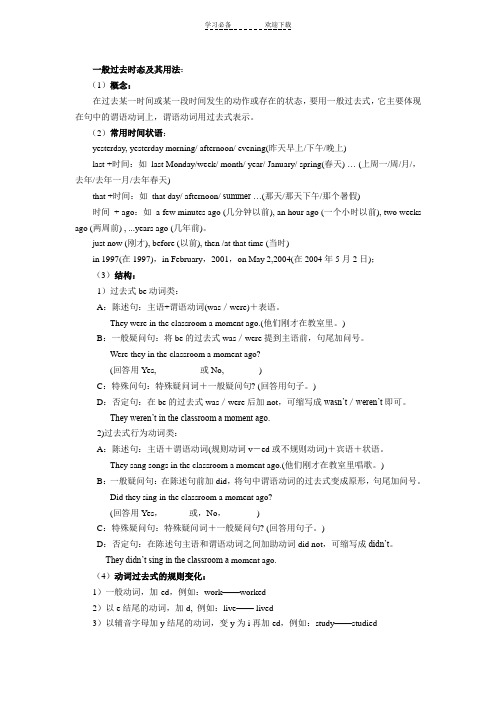
一般过去时态及其用法:(1)概念:在过去某一时间或某一段时间发生的动作或存在的状态,要用一般过去式,它主要体现在句中的谓语动词上,谓语动词用过去式表示。
(2)常用时间状语:yesterday, yesterday morning/ afternoon/ evening(昨天早上/下午/晚上)last +时间:如last Monday/week/ month/ year/ January/ spring(春天) … (上周一/周/月/,去年/去年一月/去年春天)that +时间:如that day/ afternoon/ summer …(那天/那天下午/那个暑假)时间+ ago:如a few minutes ago (几分钟以前), an hour ago (一个小时以前), two weeks ago (两周前) , ...years ago (几年前)。
just now (刚才), before (以前), then /at that time (当时)in 1997(在1997),in February,2001,on May 2,2004(在2004年5月2日);(3)结构:1)过去式be动词类:A:陈述句:主语+谓语动词(was/were)+表语。
They were in the classroom a moment ago.(他们刚才在教室里。
)B:一般疑问句:将be的过去式was/were提到主语前,句尾加问号。
Were they in the classroom a moment ago?(回答用Yes,__________或No,________)C:特殊问句:特殊疑问词+一般疑问句? (回答用句子。
)D:否定句:在be的过去式was/were后加not,可缩写成wasn’t/weren’t即可。
They weren’t in the classroom a moment ago.2)过去式行为动词类:A:陈述句:主语+谓语动词(规则动词v-ed或不规则动词)+宾语+状语。
- 1、下载文档前请自行甄别文档内容的完整性,平台不提供额外的编辑、内容补充、找答案等附加服务。
- 2、"仅部分预览"的文档,不可在线预览部分如存在完整性等问题,可反馈申请退款(可完整预览的文档不适用该条件!)。
- 3、如文档侵犯您的权益,请联系客服反馈,我们会尽快为您处理(人工客服工作时间:9:00-18:30)。
a
b.表示在过去某一段时间内经常或反复发生的 动作或存在的状态.
a
eg:①上周李雷上学经常迟到(be late for). ②去年夏天我们每天都去游泳.(swim) ③雷锋总是帮助别人.(help)
2.过去的时间状语(标志词):
a. yesterday, yesterday morning /afternoon /evening, the day before yesterday(前天) b. Last week/ weekend / month /year/ night/ Monday /summer/ winter /vacation/ class…… c. 时间段+ago (以前):a week ago, two days ago, five minutes ago…… d.固定词组:just now (刚才) ,the other day (前几天), one day (有一天)…… e.相对说话以前的时间或者结合上下文判断: this morning, on my 20th birthday…… f. In+表过去的年份、月份 in 1990, in 2007, in May on+表过去的某一天 on May 1st , on March 8th
Eg:上周有两场篮球比赛 There were (be)two basketball matches last week . There weren’t two basketball matches last week.
Were there two basketball matches last week ?
5. There be 句型的一般过去时态句型:
肯定句:
was/were +某物+某地.
wasn’t/weren’t +某物+某地.
Was/Were there +某物+某地? Yes,there was/were. No,there wasn’t/weren’t
一般过去时经典例句
1 where did you go on vacation? I went to New York City. 2 where did he/she go on vacation? He /she went to Bingjing. 3 where did your mother go on vacation? She went to the mountains. 4 did you go to the Place Museum? Yes ,I did./No, I didn’t. 5 Did he/she go to the Great Wall? Yes ,he /she did./No, he/she didn’t.
a
a
a
a
be 动 词: was/were
3. 动词形式
规则变化: 实义动词: V过去式 (即:V原+ed).
1 直接+ed: worked, helped,cleaned,lived,danced… 2 以 字母e 结尾的只加d: lived, praticed, hoped
3 辅音字母+y变i+ed: study---studied, try---tried worry-- -worried 4 元音字母+y 直接加ed stayed,enjoyed,played
Yes, there were No, there weren’t
st month,hevisited(visit) his grandpa in the countryside. 2.Mike and his classmates took (take) the subway back to school yesterday. 3.Today I got (get) up at 6:30.Iwas (be)late for class. didn’t 4 Did you have (have) a good time last Sunday?No, I_____. 5.-Where were (be) you last night ? Icalled (call)you, but you were(be) not at home. -Oh, I was (be) in my uncle’s house. 6. How was (be) your weekend? It was great. 7. Last year,I went (go) to Beijing.I saw (see) Beijing Opera there and I took (take) lots of photos. 8.Therewere(be)many smart animals in the zoo3years ago. 9.-What was (be) the weather like here at this time Slast summer? -It was (be) rainy. 10.-Whatdid hedo (do) yesterday morning ? -Hestudied (study) for his English test.
21.-What are you doing now? -Weare having (have)dinner. And we usually eat f g (eat)dinner this time.But yesterday we had (have) g dinner a little later. 22.In the last class, Bob wasn’t (not be)in the classroom, r so he didn’t know (not know)what the teacher said.
5 双写再加ed stopped
4.一般过去时态的各种句式结构(或转换):
a. be动词: was/were 肯定句: 主语+was / were +其它... 否定句: 主语+wasn’t/weren’t+其它... 一般问句: Was/Were+主语+其它…? Yes,主语+was/were No,主语+wasn’t/weren’t
语法:一般过去时态
1. 意义
2.
3. 4. 5. 6.
时间标志词
动词形式 一般过去时态的各种句式结构 There be 句型的各种句式结构 练习题
一般过去时态
1.定义:a.表示在过去某个时间发生的动作或存在的状
a
态.
eg:① 上周我看望叔叔了(visit). ② 昨天他买了一台电脑(buy). ③ 去年他们去北京了(go). ④ 两年前她是一个医生(be). ⑤ 刚才我在图书馆(be)……
19.The teacher said nothing and gave (give)us some homework.
tells 20.Yesterday Ben told (tell) us some jokes.He often_______ is telling (tell) jokes after class. Listen! He (tell) his classmates jokes.
•
15 he was a small boy ten years ago. 16 They visited Bingjing in 2007. 17 I didn’t do my homework an hour ago. 18 My father didn’t play computer game last night. 19 What did you do last weekend? I cleaned my room. 20 what did they do yesterday ? They played soccer.
Exercises:
11.Whocleaned (clean) the blackboard? I did. 12.Did the boys play (play) basketball the day before t yesterday? Yes,they 13.Tomdidn’t watch(not watch)TV last night, he did(do) his g homework. 14.An earthquake made (make) many families homeless(无家可 归) on May 12th. 15.Two weeks ago,Mr Green bought (buy) a car for him. 16. Mary wrote (write) a letter to his friend last weekend. 18.-When did she come(come) to China? -She came (come)to China when she was 10 years old.
6 Yesterday I went to visit my aunt. 7 He went to summer camp last week. 8 My sister stayed at home and watched TV yesterday. 9 He did his homework last Sunday morning . 10 My daughter and I went to Qingdao last summer vacation. 11 How was your vacation ? It was great. 12 How was the weather yestersay?/ What was the weather like yesterday? It was great . 13 I was at home last weekend. 14 We were at shool yesterday morning.
